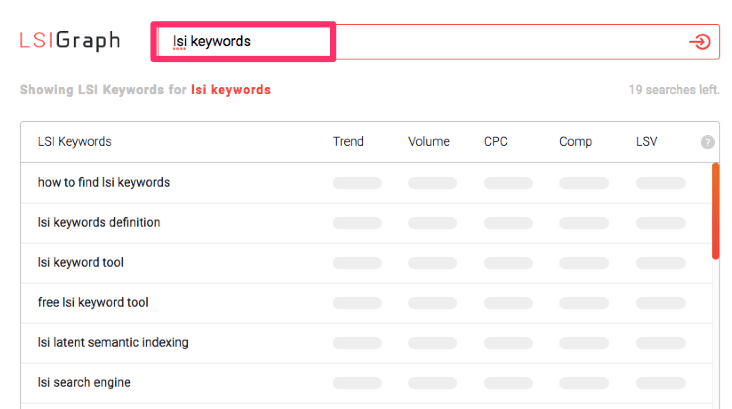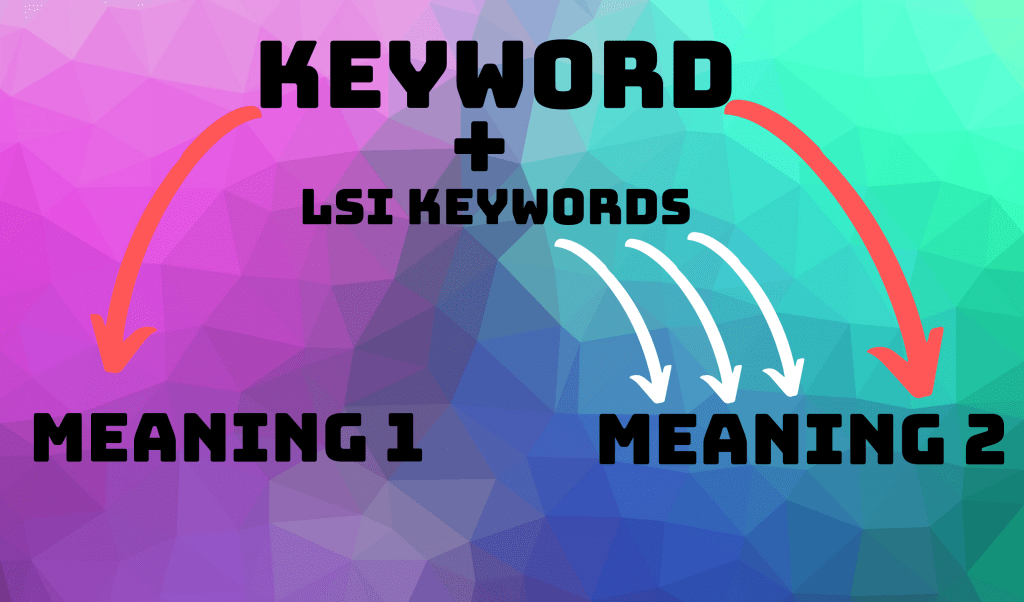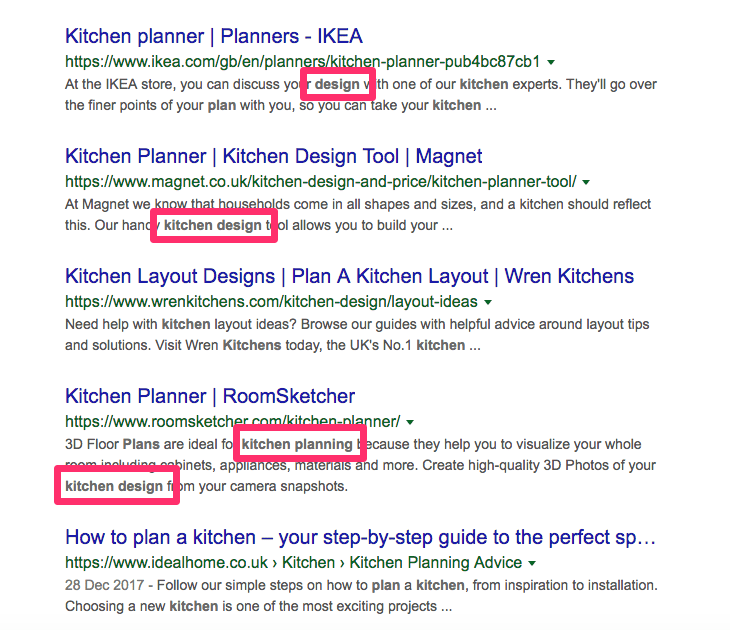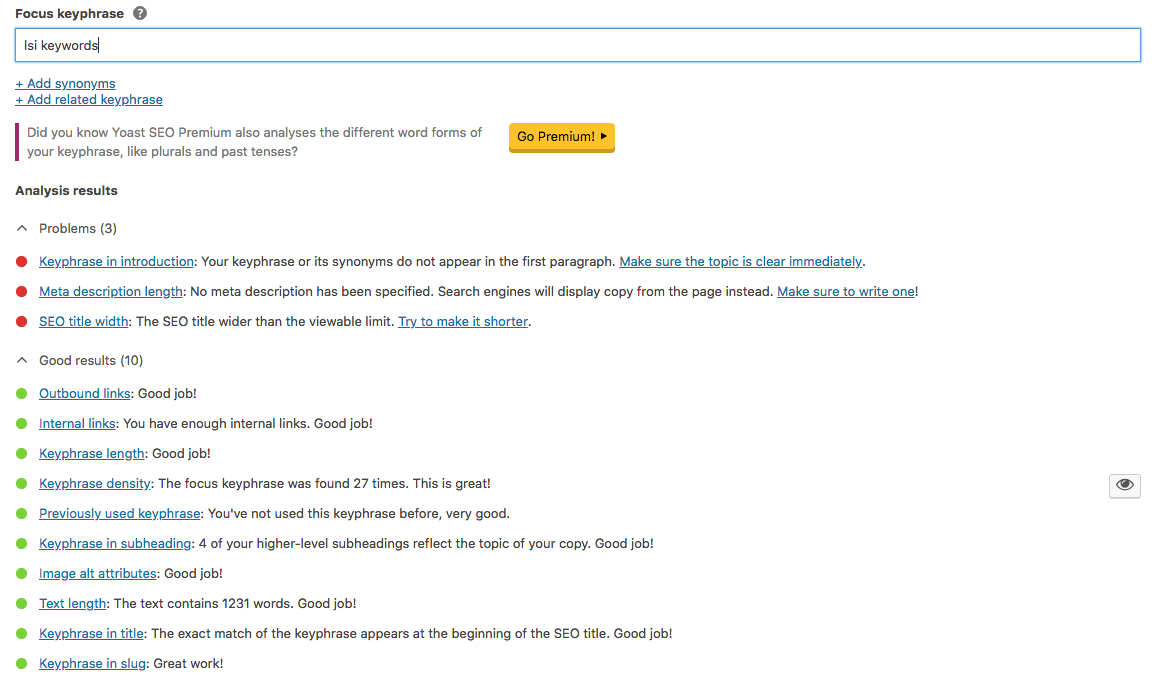Guest Contribution by Josh Barney
Are you using LSI keywords to help your search rank?
Discover what they are, some awesome free LSI keywords tools and how to use them to boost your SEO…
We all know the importance of priming content for specific keywords…
…but is it possible to use OTHER keywords to help your content rank on search engines?
Including your target keyword(s) in your headline, content, sub-heads, image alt-text, meta-description (etc.) will help it rank, but are there other terms that you can sprinkle through your content to give it a ranking boost? And how can you find them?
In this SEO article, I’m going to discuss these questions, analyze the difference in (SEO) opinion and simplify an SEO strategy (that sounds much more complicated than it actually is).
That’s right, we’re going in deep on LSI keywords and we’re not going to quit until you’ve got them locked down.
Let’s get it…
What are LSI Keywords?
LSI (latent semantic indexing) keywords are terms that are found together within a single piece of content that help AI understands the meaning of your content (semantics). These LSI keywords give meaning to terms that AI would otherwise find ambiguous.
For example, if you made a search for a term that included the word ‘windows’, a search engine would use keywords like ‘computer’, ‘Microsoft’ or ‘software’, to rank content that refers to the Microsoft computer programming system…
…or keywords like ‘House’, ‘Glass’ or ‘Double-glazing’, to rank content that relates to household windows.
BTW: TF-IDF is the measure of keyword relevance, LSI keywords are the tool that search engines use to help them understand the TF-IDF.
LSI Keywords and TF-IDF (term frequency-inverse document frequency) are crucial for search engines. Without them, search engines simply would not be able to work at the level that searchers require.
VERY IMPORTANT: Before you go any further, it’s crucial that you don’t misunderstand what LSI keywords are. They ARE NOT synonyms. They are words that help create the context for a searcher’s keyword using semantics.
e.g. An LSI keyword for windows is NOT aperture, that is a synonym.
Do LSI Keywords Help Search Rank?
This question (above) has been widely debated in the world of SEO, with many experts claiming that LSI keywords have no bearing on search rank, whilst others claim that it absolutely does.
And there’s a good reason for this debate because there isn’t enough evidence or proof to suggest that LSI keywords have an impact on search engine algorithms.
But, just because everybody else is in disagreement, that doesn’t mean I’m not going to voice my opinion.
I believe that LSI keywords do make an impact, and even if I’m wrong (and you don’t agree with me) I still recommend that you use them.
Here’s why…
- LSI keywords will help you rank for keywords that are similar to your own (because they’re littered through your content).
- Google use them to understand your content
- They appear in searches
- LSI keyword research can give you tons of new content ideas
And if all that wasn’t enough, check this out:
When I make a generic search for a (slightly) ambiguous keyword like ‘kitchen plan’ (random idea off the top of my head) you can see that Google actually highlights other LSI keywords on their results page:
Google has recognized my search intent and highlighted terms like ‘design’, ‘kitchen design’ and ‘kitchen planning’ in the TOP organic results.
If these terms were NOT included in the content, do you think these results would rank as high? Let me know what you think…
Before you go any further with this article, open a new tab and load Google. Make a search around a keyword in your industry. Have Google highlighted any words that aren’t part of your search query?
How To Find LSI Keywords
Hopefully, you can see the importance of LSI keywords and you understand why you should be using them…
…and even if you don’t think they can have an impact on your search rank, LSI keywords can be a great source for mining new content ideas and target keywords.
There are many free LSI keyword tools, but I have two personal favorites:
- LSIGraph: this tool allows 3 FREE searches per day, or 20 if you register (by giving them your email address).
- LSIKeywords: Unlimited searches, created by the same team who built Keywords Everywhere (one of my most used keyword tools).

Both of these tools are incredibly easy to use (I’d recommend using both to cover all bases). Simply enter the keyword you’d like to rank for in the search box and wait for the suggested LSI keywords to appear.
These free LSI keyword tools will quickly give you the recommended terms to use in your content marketing strategy.
LSI Keywords For SEO
By now you should have the LSI keywords meaning strapped tightly under your belt and a list of LSI keywords prepped for your next piece of content.
BTW: LSI keywords are also known as Semantic Keywords
But how exactly should you use your LSI keywords?
The answer is pretty unremarkable, in fact, it’s very similar to how you should already be implementing your on-page keyword SEO.
If you’re stuck for ideas, here’s the process that I go through for every article:
- Create content, using my proven keyword strategy.
- Perform the LSI keyword search (after the article is written)
- Narrow the LSI keywords down to the most relevant to my article. It’s important that you don’t try to use all the semantic keywords in your content. You should focus on terms that fit, don’t ruin the quality of the content and will help Google rank you for relevant searches. After all, is there any point in ranking for a query that will never generate clicks?
- Sprinkle the LSI keywords through my content. If there are any semantic keywords that are also questions, I edit my sub-headings so they fit.
- Add the most RELEVANT to my meta-description, in the hope that Google will highlight in the search (and hopefully make my result stand-out from the rest).
VERY IMPORTANT: Remember, not all of your content will rank on search engines (especially if you’re just starting out). You must be consistent and diligent. Sooner or later, you’ll get the results you deserve.
Semantic Keywords in Action
Throughout this article, I’ve sprinkled LSI keywords that should help this article to rank (if it meets the many other ranking factors that Google takes into account).
Go back through this article, look at the sub-headings and the number of stand-out search terms that have been embedded in the content. How many LSI keywords can you see?
BTW: I would list all the semantic keywords that I have used in this article, but it’s much more fun for you to search for them and it would be harmful to our on-page SEO if I listed them!
If you’re really interested, you could even use one of the LSI keyword tools to see what terms I found AFTER writing this article and then how I sprinkled them through the content.
Conclusion
AI is so advanced now that you need to take every step possible to rank higher on search engines.
LSI keywords will help search engines understand your content and therefore improve your rank on the SERPs.
If you haven’t already, try a search in your industry and see what you find, before checking out one of the LSI keyword tools.
***
This article was originally published on EinsteinMarketer.com.








